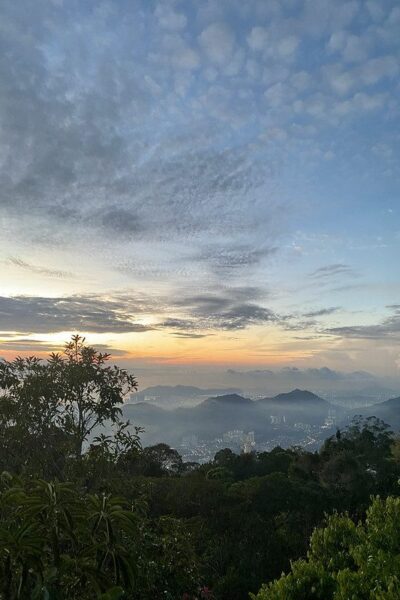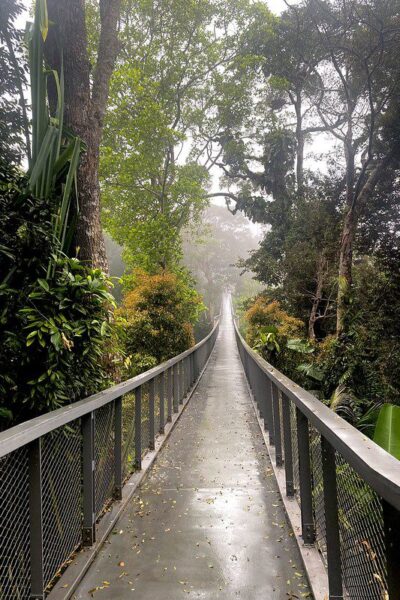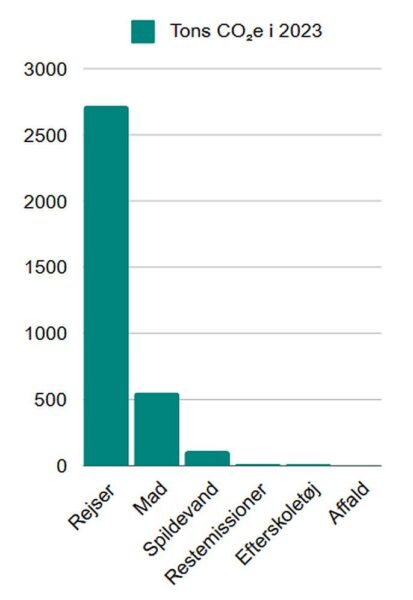Sustainability at Ranum
ESG, climate & responsibility
ESG, climate & responsibility
Ranum Efterskole College has chosen to prepare a ESG report to get a concrete starting point for the school's work with sustainability in operations and, not least, in the teaching and educational process with the students. The purpose of the ESG work is to combine a focus on sustainability with our core task of creating curious and responsible young people.
No Ranum Efterskole College without the 'D' for education. At REC, we see good education as our most important task and as the finest gift we can give our students to take with them in life. We travel, work and teach based on the motto 'The more you know - the more you care'. And the world needs us to care - young and old - which is why we want to work even more with responsibility, climate and sustainability. As with everything else, our approach to ESG is explorative because we find that it makes sense to use actively on a efterskole.
Courage to act, curiosity and active hope are and must be our driving force in the dialogue about the green transition with students and each other. And we will continue to explore what happens when you add education to that equation. We believe this report is an important starting point for an important conversation - at school and in our encounter with the world we explore.
Throughout the school's history, we have prioritised projects that focus on wildlife, nature and social responsibility. In 2023, we again had many of these projects - both at the school, as part of our teaching and on our travels.
Hands on understanding
At REC, it's important to make climate impact and sustainability tangible. In Fashion and Sustainability, students work to understand the clothing industry and are taught how to reuse and upcycle clothing and fabric. In Green Fingeres, students learn about caring for crops, re-cultivating vegetables and caring for our donkeys, alpacas, chickens, goats and more.
Nature
In 2023, we had several nature-orientated projects both at school and while travelling. Students participated in tree planting projects in Costa Rica. Another group of students have had the subject 'Coral Restoration' throughout the year, and on Bonaire, they helped restore mangrove planting and coral reefs. In Brasilien, students learnt about rainforest and the dangers of deforestation in Regua. In Thailand, we collected rubbish and plastic at the stands.
Animal Life
At the school, we have several different animals to give students the opportunity to experience the joy of caring for animals and following their development. In Namibia, the students visit N/a'an Ku sê every year, where they both teach and help out at a Wildlife Centre. On several of the trips, the students learn about the local wildlife, and at the same time, we engage in dialogues with the students and locals about the animals' habitats, challenges and how to remedy the problems.
Close to reality
We always endeavour to get as close to reality as possible when we travel the world. Therefore, we always prioritise 'home stays' with local families, where students get an insight into what life can also be like when, for example, living with fewer resources. In addition, the students in 2023 visited townships and poor neighbourhoods to open up conversations about privilege, social inequality, democracy, freedom and responsibility. On the 2023 trip to Bali, we volunteered to distribute food to the needy in the local community.
Another approach to these conversations is to visit local schools in the destinations. In 2023, we visited our twin school in Nepal. School visits are something we prioritise and always try to include on our trips, as the youth-to-youth meeting often has a completely different impact on the students. When we return home, it is also often school visits and home stays that have made the biggest and most lasting impressions on the students.
Historical understanding
When travelling, we try to implement lessons in relevant and local history. In South Africa, students learnt about Nelson Mandela and apartheid, and we visited Robben Island. The historical retrospective gave the students a greater understanding of the challenges faced by different areas and population groups over time.


Now that the ESG work is underway, we have an overview of where the school stands in terms of emissions, social sustainability and governance. We have looked back at 2023 and now we want to look forward to 2024 and the years to come. Therefore, it is relevant to set goals for how we want to work with these topics over the next year. ESG work is something that must take place in, and be a part of, our regular operations. These goals will help make the work both sustainable and relevant.
Data collection
In our ESG process, we have come to realise that thorough data collection is key to gaining the most accurate insights. Therefore, going forward, we will focus more on continuously collecting data for next year's ESG reports.
Travelling and emissions
We travel a lot, and we see the value of travelling when we look at the development of our students after a year at REC. Therefore, we will continue to travel, but we will also explore more climate-friendly forms of travel and further emphasise the content of the trips, which must also resonate with climate, global goals and responsibility.
Energy management
As in the past, where we have installed solar panels and purchased green electricity certificates, we will continue to monitor and optimise our energy consumption. This means that we are constantly looking for possible solutions that can create energy savings.
ESG and education
Education is our core task. Therefore, we will continue to explore and develop the interaction between ESG and education. The hope is that the students will eventually be able to help create the ESG reports to make the topics tangible for the students.
Developing an education contract
The ESG work has generated many new mindsets and ideas. One of these ideas is an annual education contract, where both employees and students commit to selected goals and focus areas within sustainability, climate and responsibility. Right now, the education contract is in its early stages, but we hope to implement it and the concept soon.
Green spaces
REC covers a large area, so it is natural that we are converting some of our green areas into biodiversity oases where nature itself can prevail for the benefit of both animals and plants and, not least, beautify the school's grounds.
Of the emissions we have included in the climate accounts, travelling is by far the biggest emitter. Flights and long journeys, with multiple stopovers, account for a large amount of emissions.
On the other hand, the emissions for food are lower than the average Dane. If only students are included, this equates to approximately 1.2 tonnes of CO₂e.
Employees are not included, so the actual figure is even lower. The average Dane has 2.6 tonnes of CO₂e.
Source: https://concito.dk/udgivelser/danmarks-globale-forbrugsudledninger
